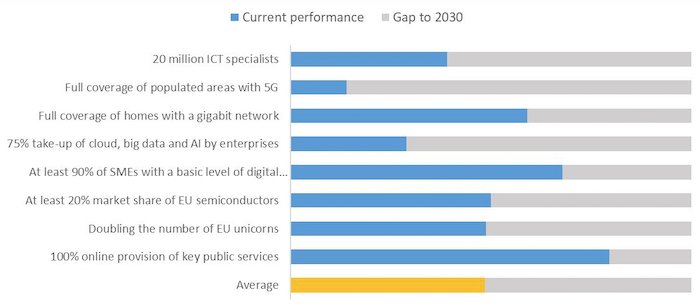The European Fee (EC) lately proposed a plan, dubbed , to extend Europe’s international contribution to semiconductor manufacturing by 2030.
This proposal comes at a time when there have been vital provide failings inside the international chip trade with even the most important chipmakers failing to satisfy demand from clients in crucial industries like automotive and shopper merchandise.

The EU’s present progress towards the 2030 targets for an “inclusive and sustainable digital society.” Picture used courtesy of the
As well as, the COVID-19 pandemic has highlighted simply how a lot the EU depends on key applied sciences owned by U.S. and Chinese language firms.
Ramping Up EU Chip Manufacturing
“It’s our proposed degree of ambition that by 2030 the manufacturing of cutting-edge and sustainable semiconductors in Europe together with processors is a minimum of 20% of world manufacturing in worth,” reads an .
In 2020, solely 10% of the worldwide manufacturing of pc chips passed off within the EU. By doubling this to twenty% by 2030, the EU hopes that it could actually turn out to be much less reliant on applied sciences which have historically been manufactured exterior of the buying and selling bloc and .
In keeping with the plan, European officers additionally wish to dilute the dominance that U.S. and Chinese language firms have within the chip manufacturing (and the broader tech) area total. Of the world’s , just one relies within the EU—NXP Semiconductor of the Netherlands, which is the tenth largest.
| 1. | Inter (Santa Clara, CA) |
| 2. | Taiwan Semiconductor Manufacturing Co. (TSMC) (Hsinchu, Taiwan) |
| 3. | Qualcomm (San Diego, CA) |
| 4. | Broadcom (San Jose, CA) |
| 5. | Micron Know-how (Boise, ID) |
| 6. | Texas Devices (Dallas, TX) |
| 7. | ASE Know-how Holding Co. (Kaohsiung, Taiwan) |
| 8. | NVIDIA Corp. (Santa Clara, CA) |
| 9. | STMicroelectronics (Geneva, Switzerland) |
| 10 | NXP Semiconductors (Eindhoven, Netherlands) |
Prime 10 chipmakers as of July 2020. Information pulled from
The EU’s newest effort to assert digital sovereignty is hardly new; it has been a speaking level for a number of years now. Nevertheless, the GDPR—which supplies Europeans higher management over their information—has largely been seen as a turning level, and plenty of Member States are actually being pushed from merely speaking about taking motion to truly doing it.
Taking part in Politics with Silicon
Doubling the quantity of chip manufacturing that goes on contained in the bloc will probably be a mammoth endeavor, nevertheless.
One of many largest challenges will probably be that each the , and each nations arguably have the capability to take action and dwarf the EU within the course of.
The U.S. has already restricted China’s entry to chips involving U.S. mental property on the grounds that they may very well be utilized by the Chinese language army.
Final 12 months, China’s SMIC was amongst 60 companies placed on a blacklist by the U.S. authorities. This transfer may have an effect on the corporate’s R&D and manufacturing capability of chips on 10nm course of nodes and beneath and has compelled China to take motion. In keeping with its , China says that it’s going to concentrate on analysis and improvement in built-in circuit (IC) design instruments, key tools, and key supplies.
In keeping with a latest report ready for President Biden, the administration ought to be taking steps to make sure that China is .

President Biden at a press convention on the worldwide chip scarcity. Picture used courtesy of Jonathan Ernst and
Efforts like these to extend home chip manufacturing by the U.S. and China (and now the EU) have been described because the “” by ON Semiconductor’s Keith Jackson. However does the EU stand a practical likelihood of competing on the identical scale?
How Can the EU Compete?
As soon as upon a time, Europe had a thriving chip trade. Over time, nevertheless, European companies have outsourced an increasing number of of their manufacturing. This consists of each NXP Semiconductor and Infineon Applied sciences, the 2 most recognizable European chipmakers.
It’s not as if chip fabs might be thrown up in a single day, both. In keeping with the U.S. Semiconductor Trade Affiliation (SIA), . As soon as a facility is constructed, it could actually take a number of years earlier than it turns into worthwhile. These prices are additionally rising as chip generations develop extra superior and are constructed on smaller course of nodes.

Rendering of TSMC’s Fab 18, which is a 5 nm manufacturing facility. Picture used courtesy of
There’s a cause that NXP and Infineon have elected to outsource their chip manufacturing to the likes of TSMC—one of many prime chipmakers on the earth. It, due to this fact, appears unlikely that EU companies may very well be inspired to convey their manufacturing again in-house. However what about bringing a TSMC or Samsung fab to Europe? Each firms have demonstrated their willingness to construct worldwide amenities in and respectively.
Thierry Breton, the EU’s inside market commissioner, has beforehand argued for a significant new fabrication plant to be constructed contained in the bloc however acknowledged on the time the EC report launched that it was not but clear whether or not this might contain making an attempt to persuade TSMC, Samsung, or one other main chipmaker to ascertain a European website.
“Europe has woken as much as the fact of the US-China know-how ‘warfare’ ought to play on its strengths to cut back its vulnerabilities to future shockwaves,” reads .
Below the 2030 Digital Compass plans, the EC will push particular person Member States into motion by conducting annual progress evaluations however is letting nationwide governments act autonomously in taking steps to extend chip manufacturing.
Featured picture (modified) used courtesy of Francois Lenoir and



